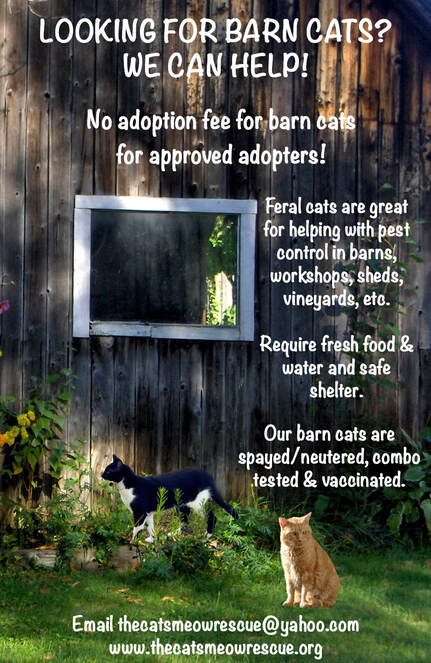If you are interested in adopting a barn cat, please complete and return our BARN CAT ADOPTION APPLICATION and email it to [email protected]
AVAILABLE BARN CATS:
We do not currently have any barn cats available. Please check with your local shelter to see if they have any barn cats in need.
IMPORTANT INFORMATION: HOW TO ACCLIMATE A BARN CAT TO A NEW HOME
Relocating a feral or outdoor cat to a new setting requires a little time and preparation. If you bring a cat to a new outdoor home, it is unfamiliar territory, which can be frightening for a new cat, and if they are not properly acclimated to the new home, they will run away the second they are released.
In order to ensure that your new barn/outdoor cat will remain at your home/facility, take the following steps to acclimate the kitty, allowing him to become familiar with the new environment and claim it as his new territory.
In order to ensure that your new barn/outdoor cat will remain at your home/facility, take the following steps to acclimate the kitty, allowing him to become familiar with the new environment and claim it as his new territory.
- The important thing in the acclimation process is to keep the kitty confined in a safe area for a few weeks so they can learn that is their new home/territory. This will also give them time to get used to you as a caregiver and provider of food. A small room (utility, storage or office area) in the barn/shop is a great place to introduce the kitty. This will offer some additional privacy and security for the kitty and provide additional safety as you begin the acclimation process. Ideally, you should have a large cage, kennel or enclosure set up for the cat within the room, building or in the sheltered area they will be calling home. Along with food, water, and a litter box, include a carrier lined with blankets or towels as a bed and secure "hiding place" within the cage. Leave the carrier door attached, but prop it open with a bungee chord so you can easily close the carrier door when needed. Using a natural based litter (pine pellets, cedar shavings, corn based, etc,) or regular clay litter works best for both clean up (just empty the box each day) and it won't create as much mess in the cage if the cat spills the water or throws litter out of the box.
- Clean the cage, change the litter and give fresh food and water daily. Often the kitty will retreat to the carrier for security while you are tending to the cage, but it never hurts to be prepared: Wear thick, scratch/bite protecting gloves to guide the kitty into the carrier and close the door. This will make tending to the kitty's needs easier and reduce the risk of injury or the cat escaping while the door is open. Once you are finished, open and secure the carrier door (again, wearing gloves will help protect your hands if the cat is scared and swats).
- After 2-3 weeks, the cat should be familiar with their new home and ready to release. After tending to the cage, leave the cage and carrier doors open. Food and water should be kept both inside and outside of the cage. Once the cat explores the area outside of the cage, he may feel comfortable enough to venture out for good, however, leave the cage open and available for a few days to give the cat a secure place to retreat to if desired.
- After two more weeks, the cats should be comfortable in their new home and the cage can be removed if preferred.
- IMPORTANT: Continue to provide fresh food and water daily. Even outdoor/barn cats cannot sustain themselves on hunting rodents alone. They need a nutrient rich diet to live a healthy life. You can also provide litter boxes within the building/barn they will call home, though some cats may prefer to eliminate outside.
|
If we do not have any barn cats available, please check with the
Longview Animal Care and Adoption Center Website: http://www.LongviewTexas.gov/Animals Facebook: https://www.facebook.com/friendsofLACAC Phone: (903) 297-7387 Hours of Operation: Monday: CLOSED Tuesday: 11:00 AM - 5:00 PM Wednesday: 11:00 AM - 5:00 PM Thursday: 11:00 AM - 5:00 PM Friday: 11:00 AM - 5:00 PM Saturday: 11:00 AM - 5:00 PM Sunday: CLOSED |
PLEASE NOTE: TCMR does not trap or take in feral cats from the public. If you need assistance with feral cats, contact your local animal control or a Trap-Neuter-Return (TNR) organization in your area.
Longview TNR Organization: Gatos Amigos email [email protected] Kilgore TNR Organization: Wildcatters email [email protected] TNR Texas - This website can help you find where to get the assistance needed in your area of Texas as well as some State & National groups.
|
